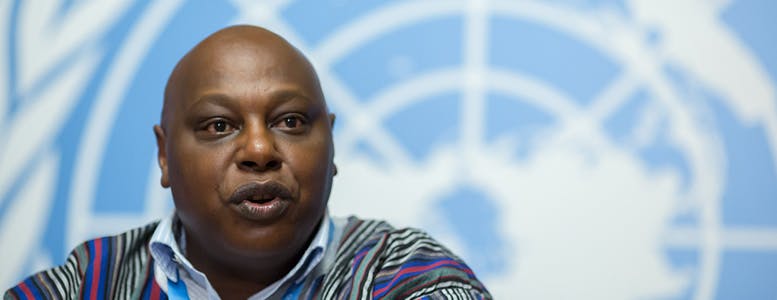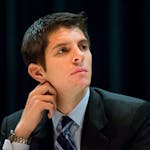
Protecting human rights around the world is a key pillar of the United Nations’ work – and the driving force behind Maina Kiai’s career. From 2011 through this year, Kiai has served as the UN Special Rapporteur on the rights to freedom of peaceful assembly and of association.
As a special rapporteur appointed by the UN Human Rights Council, the UN’s top intergovernmental human rights body, Kiai “examines, monitors, advises, and publicly reports on the rights to freedom of peaceful assembly and of association worldwide.”
In this role, Kiai has highlighted the importance of ensuring freedom of peaceful assembly and association in the workplace, elections, and even at the UN. He has visited countries around the world to assess the situation on the ground including Georgia, Rwanda, Kazakhstan, Oman, the Republic of Korea, Chile, and the United States. And he has provided recommendations to UN member states on protecting those rights and ensuring fundamental freedoms.
In recognition of his service, the United Nations Foundation honored Kiai on October 19 with the Leo Nevas Human Rights Award as its annual Global Leadership Dinner.
Presenting the award, UN Foundation Deputy CEO Elizabeth Cousens noted Kiai’s commitment to human rights, saying:
“Maina Kiai has been a powerful champion of human rights in his native Kenya for over 20 years. Whether battling corruption, pressing for vital constitutional reforms, or insisting that we hear, and heed, the voice of the most vulnerable, he has won acclaim for his courageous and effective advocacy. In 2007, in the tumultuous aftermath of a disputed national election, Mr. Kiai – then Chairman of Kenya’s National Human Rights Commission – was a clarion voice against violence and bloodshed, even in the face of death threats.”
Highlights from Kiai’s career include:
- 20 years advocating for human rights and constitutional reform in Kenya. This includes founding the unofficial Kenya Human Rights Commission and serving as Chairman of Kenya’s National Human Rights Commission; and
- Former service as the Executive Director of the International Council on Human Rights Policy, the Director of Amnesty International’s Africa Programme, and the Africa Director of the International Human Rights Law Group.
- Kiai, a lawyer, now serves as the co-director of InformAction, a non-governmental organization in Kenya focused on community organizing.
When accepting the award, Kiai said:
“Today, we are in the midst of an epic global struggle over people’s ability to shape the societies in which they live: their right to express themselves, to peacefully assemble and associate, to share ideas, and to dissent.
We often describe this as ‘closing civic space.’ But it is more than that: What we are facing today is a contestation between ‘openness’ on the one hand, and ‘closedness’ on the other.
Every part of the world today has its own version of the closed society, as evidenced by growing fascist rhetoric and actions; intolerance against those who are different or disagree with us; xenophobia; racism and misogyny.
But the number of people pushing back against these efforts is breathtaking, as we see from the almost continuous eruption of mass protest movements globally.
People have an instinctive drive for freedom, and they don’t give it up easily.
As Special Rapporteur, I have had a front-row seat in observing this struggle against closedness: documenting it, analyzing it, cheerleading for it, and yes – participating in it myself.
That is what each one of us should do in affirming the noble ideals of the United Nations.
Sometimes, at certain moments, ‘closedness’ wins out. But that, I dare say, only increases anger and frustration with dramatic consequences that affect us all, wherever we live.
We have seen glimpses of this in Syria, Libya, and now Ethiopia. Closed societies will inevitably be challenged, and where non-violent actions are impossible, some may turn to violence.
Our choice should be to build rather than destroy. An independent, vibrant, diverse, and active civil society is precisely the engine to fuel this kind of openness.
The dividends from a thriving civil society are limitless. Crucially, this facilitates new ideas and fresh perspectives – which we desperately need today.
The human rights movement has been phenomenal in shaping our global values these last decades, but we are on the back foot as the ethos of human rights is challenged by the proponents of closed and intolerant societies. To restore human rights as a value system for human dignity, we need to get back to our roots.
Throughout history, positive and sustainable change has only occurred when diverse alliances and movements have been created.
Nothing is more powerful than when human rights groups join in action with labor unions; when labor unions join forces with students, peasants and indigenous peoples; when religious leaders show common cause with Dalits, minorities, and the LGBTI community; and when all these come together to rally business to value humans as much as profit.
I am optimistic that this can be done. I know the scale of this struggle; but I have also seen up-close in activists’ eyes, the insatiable hunger for freedom and dignity. It cannot be stopped by laws, jails, or bullets: These merely delay the inevitable.
Let me pay tribute to all those who have made my time as Special Rapporteur an incredible and fascinating privilege: The survivors, civil society organizations, governments, donors and my team of colleagues who have been indispensable to the mandate’s work.”
To learn more about the special rapporteur’s work, visit http://freeassembly.net/.



 View All Blog Posts
View All Blog Posts